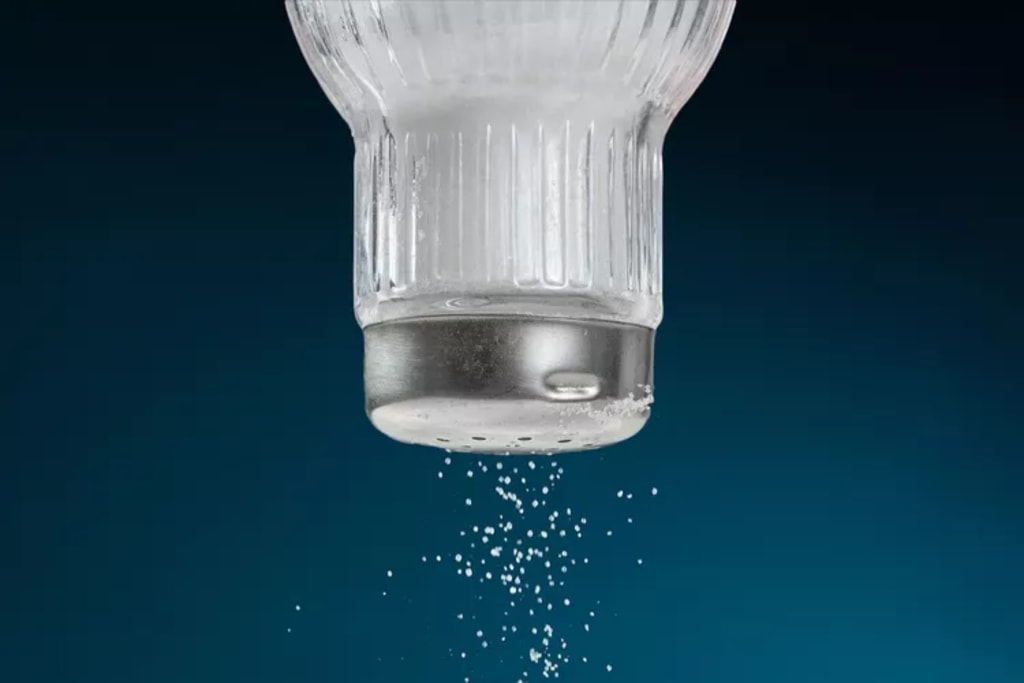Does Salt Make You Gain Weight?
Shaking the saltshaker too frequently may sabotage your weight-loss goals.

Salt is a calorie-free condiment used to preserve food and elevate the flavor in a uniquely delicious way. But even though salt has no fat, calories or any other factors that traditionally contribute to weight gain, surprisingly, consuming it may be linked to weight gain.
How Salt Can Make You Gain Weight
Conventional wisdom would lead people to believe that eating a calorie- and fat-free item would be A-OK for people trying to lose weight. And while eating salt doesn't directly cause weight gain, there is evidence to suggest that consuming it in excess may not be best if you are focused on weight management.
It is well-established that consuming too much salt is linked to elevated blood pressure. And, more recently, more evidence has shown that high salt intake is associated with an increased risk of obesity.
How are the two linked? One reason for this association is that high salt intake makes people feel more thirsty, which in turn, can cause an increase in fluid intake. But it's not simply any fluid that people who eat salt drink. According to a 2021 meta-analysis published in the British Journal of Nutrition, those eating a saltier diet tend to lean on sugar-sweetened beverages to quench their thirst. An increase in salt intake is associated with an increase in sugar-sweetened soft drink consumption of up to 26 grams per day in children and adolescents. And it is well-established that consuming excessive amounts of added sugar is linked to weight gain. Adding salt to the diet also increases appetite and, consequently, the pleasing taste of many foods and a greater energy intake, per a 2018 article published in Nature Reviews Nephrology.
People who eat a lot of salt also tend to eat more ultra-processed food that is higher in both calories and salt, per a 2019 study published in Cell Metabolism.
Research published in 2018 in Nutrition Research evaluated whether there is a link between salt intake and obesity, independent of energy intake. Using data from a survey, results showed that salt intake was higher in individuals with excess weight and obesity. Specifically, each 1-gram per day increase in salt intake was associated with a 15% increased risk of obesity. Higher salt intake was also significantly related to higher abdominal obesity. These results suggest that salt intake is a potential risk factor for obesity independent of energy intake.
Does Dehydration Cause Weight Gain?
Ways to Reduce Salt Intake
If you are focused on eating less salt to support your weight-management goals, doing so doesn't mean having to eat bland and tasteless dishes. By using some creative hacks, you can easily enjoy your meals while monitoring your salt intake.
Some simple ways to add some delicious flavor to your food without overdoing it on the salt include:
Opt for fresh meats instead of pre-packaged and ultra-processed options.
Lean on frozen or fresh vegetables instead of canned, or look for no-salt-added options.
Keep your spice rack stocked with salt-free flavorings, like turmeric, garlic powder and Italian seasoning blend.
Taste your food before adding salt to it, and don't automatically sprinkle this condiment on your food.
The Bottom Line
There is no doubt that eating a salty pretzel or sipping on a dirty martini is absolutely delish. But if you are trying to manage your weight, eating large quantities of salty stuff may not be doing you any favors when it comes to attaining your weight goals. While eating salt won't directly cause you to gain weight like eating excessive calories can, data shows that those who shake the saltshaker on their food too frequently may tend to be at an increased risk of obesity. Instead of leaning on salt to season your foods, enjoying different sodium-free herbs, spices and other flavorings, like garlic, basil and black pepper, can help you enjoy your food without overdoing it with the salt.
The 2020-2025 Dietary Guidelines for Americans recommends adults limit sodium intake to less than 2,300 milligrams daily, equating to about 1 teaspoon of table salt. For generally healthy people, sticking to that limit will likely help you manage your weight, as long as your overall diet is well-balanced and you practice physical activity frequently.






Comments
There are no comments for this story
Be the first to respond and start the conversation.